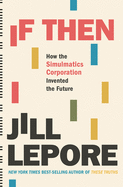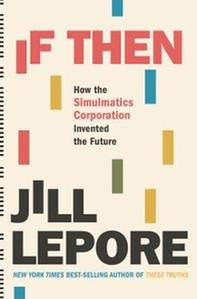
 It seems there isn't an aspect of contemporary life that hasn't felt the impact of big data and data analytics. But familiar as those terms may be, the early days of the science behind them is likely equally obscure. Harvard historian and New Yorker journalist Jill Lepore's If Then: How the Simulmatics Corporation Invented the Future unearths that history in a fascinating account that's both illuminating and cautionary.
It seems there isn't an aspect of contemporary life that hasn't felt the impact of big data and data analytics. But familiar as those terms may be, the early days of the science behind them is likely equally obscure. Harvard historian and New Yorker journalist Jill Lepore's If Then: How the Simulmatics Corporation Invented the Future unearths that history in a fascinating account that's both illuminating and cautionary.
Founded in 1959 and bankrupt by 1970, Simulmatics Corporation was the brainchild of Ed Greenfield, a Madison Avenue advertising executive who dabbled in Democratic politics and had an affinity for the civil rights movement. Greenfield's goal, as Lepore (Joe Gould's Teeth) describes it, was to "automate the simulation of human behavior" through a computer program nicknamed the "People Machine." To pursue that dream, Greenfield recruited an all-star team of behavioral and computer scientists, most prominent among them Ithiel de Sola Pool, an MIT professor and the company's co-founder. One notable omission from Simulmatics's roster was Eugene Burdick, a colorful academic who had worked for Greenfield in the 1950s, and who later wrote The 480, a novel highly critical of the company's goals and methods.
Simulmatics first came to prominence in 1960, when John F. Kennedy's presidential campaign hired it to undertake a study of the Black electorate. Lepore doesn't resolve the debate over how influential the company's aid was in JFK's election victory, but the company was at least able to parlay that involvement into a hapless effort providing election night projections for the New York Times in 1962.
At the heart of Lepore's story is a detailed recounting of Simulmatics's shadowy role assisting the United States' counterinsurgency program in Vietnam. Under the leadership of Pool, who called the war-ravaged country "the greatest social-science laboratory we ever had," the company's crew of "oddballs, has-beens, and outcasts" oversaw an array of studies that sought insight into the hearts and minds of the Vietnamese people. In the end, though, this psychological warfare research proved as ineffectual as the United States' actual military effort.
Lepore draws a through line from the conceptually sophisticated, if technologically rudimentary, work of Simulmatics to the efforts of Cambridge Analytica that were instrumental in Donald Trump's election victory in 2016, and on to ubiquitous social media platforms like Facebook. While Simulmatics's record of accomplishment ultimately was less than impressive, understanding its story is essential for anyone who wants to appreciate large aspects of how modernity launched into a hyperconnected and uneasy present. --Harvey Freedenberg, freelance reviewer
Shelf Talker: Jill Lepore tells the colorful story of Simulmatics Corporation, a pioneer in the data-driven study of human behavior.

